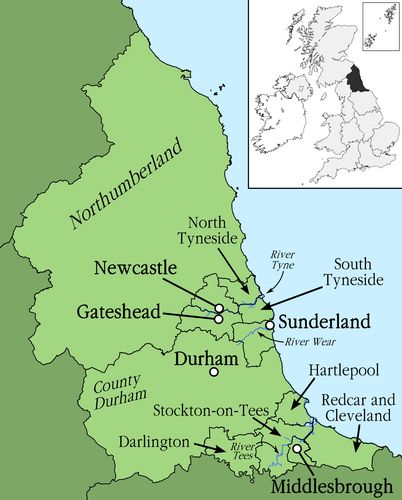Geordies, people from the city of Newcastle-upon-Tyne and its surrounding area, are generally thought as friendly, folks and fanatical football supporters.

The word "Geordie" has an ancient origin: it derives from the early 18th century, when Newcastle was supporting king George I and then George II, while the rest of the population of Northumberland supported the Scottish Jacobite rebellions.
The name only includes the Newcastle area, but the dialect has been influenced by the Northumbrian and Scottish dialects from the north and Durham and Yorkshire varieties from the south.

A broad accent such as Geordie is generally difficult to understand to other English-speakers.
This obstacle is caused by variations on sounds, especially vowels, and the use of distinctive words and non-standard grammatical structures.
Today most of the Geordies know both standard English and the regional variation and use them depending on the context.
Today most of the Geordies know both standard English and the regional variation and use them depending on the context.
 It happened that Geordies were penalised for their use of language and accent. One episode is the layoff of a Geordie female officer cadet from the British Army's Royal Military Academy at Sandhurst. The Sandhurst administration denied the accuse of discrimination, but the officer cadet in question claimed that fellow cadets taunted her with shouts of “Whey aye, man!”, and she was told by her instructor that use of the word “knackered” ('exhausted') should be replaced by "pooped".
It happened that Geordies were penalised for their use of language and accent. One episode is the layoff of a Geordie female officer cadet from the British Army's Royal Military Academy at Sandhurst. The Sandhurst administration denied the accuse of discrimination, but the officer cadet in question claimed that fellow cadets taunted her with shouts of “Whey aye, man!”, and she was told by her instructor that use of the word “knackered” ('exhausted') should be replaced by "pooped". Even though that episode, there are signs of a growing pride, with Geordie dictionaries, versions of bible stories and so on.
The majority of words come from the languge of the Anglo-Saxon immigrants of the first millennium, from southern Denmark.
Some other word can be considered effectively as truly Geordie words: pet (term of address for females – e.g. “thanks, pet”), deek (see, look at), marra (friend, mate), lowp (jump), ten o’clock (morning snack), kiff (very good), get (stupid person).
Geordie accent has a particular sound: the"burr", similar to the French pronunciation of "r".
The u vowels tend to be short, so that the vowel sounds in the words "foot" and "bus" are the same.
In many cases, what is the simple past form in standard English is also used as a participle in the Geordie variety.
Another grammatical feature is a combination of modal verbs, as "might" and "could", which are not used together. E.g. "He might could arrive before tea."
Another difference from standard English is that “but” can be said at the end of the sentence. E.g. “You’ll be late, but”.
The object pronoun can be put at the end for emphasis: “I love skiing, me”.

COMMON PHRASES!
Hoo ye gannin? 'How are you?'
Hoo's ya fettle? 'How are you?'
Y'areet, hinny? 'Are you all right, kid?'
Champion. 'Very good, very well'
Bonny day the day. 'It's nice weather'
Cowld the day, mar. 'It's cold today.'
Whey aye, man. 'that's right'
Give ower, y'a kiddin. 'Come on, you're joking'
Hadaway man. 'I'm still not convinced'
Ya taakin shite. 'I really disagree with that'
Ootside! 'Let's settle this outside'
Hoo's the Toon gannin? 'How is the Newcastle United match progressing?'
Tara now, pet. 'Goodbye (to female)'
Wee's yon slapper? 'Who's the young lady?' (derogatory)
Hoo's ya fettle? 'How are you?'
Y'areet, hinny? 'Are you all right, kid?'
Champion. 'Very good, very well'
Bonny day the day. 'It's nice weather'
Cowld the day, mar. 'It's cold today.'
Whey aye, man. 'that's right'
Give ower, y'a kiddin. 'Come on, you're joking'
Hadaway man. 'I'm still not convinced'
Ya taakin shite. 'I really disagree with that'
Ootside! 'Let's settle this outside'
Hoo's the Toon gannin? 'How is the Newcastle United match progressing?'
Tara now, pet. 'Goodbye (to female)'
Wee's yon slapper? 'Who's the young lady?' (derogatory)
No comments:
Post a Comment